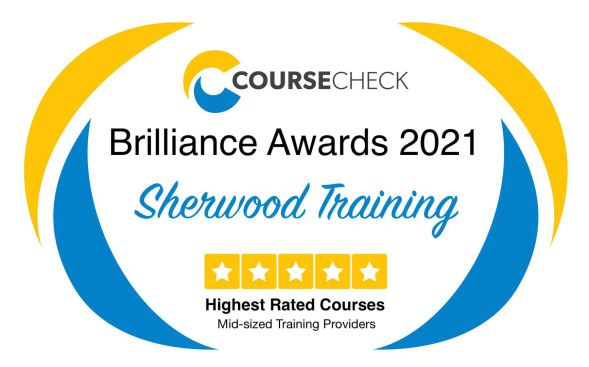What's new?
Check back here regularly to find out what's going on at our company.
Coursecheck Brilliance Award 2021
We are pleased to announce that we have been awarded a Brilliance Award from Coursecheck as the highest rated feedback from courses for a medium-sized training company:
"Every year we analyse the feedback that our customers have gathered and pick out the top-performing providers. We classify our customers as Small, Mid-sized and Large; and I’m pleased to tell you that in our category of Mid-sized training providers, Sherwood came out top with an average star rating of 4.91 from 2,694 reviews."
Positive Behavioural Support - A Competency Framework
May 2015
The PBS coalition, a subgroup of the Challenging Behaviour National Strategy Group, has developed a competence framework with the help of funding from Skills from Care. The framework sets out what people need to know and the skills they need in order to implement PBS with people with learning disabilities whose behaviour is described as challenging.
The framework has been endorsed by Mencap, Ambitious about Autism, Skills for Health, Skills for Care, UK-SBA as well as a number of other organisations.
Dr Peter Baker, Dr Nick Gore & Professor Peter McGill from Tizard have all been heavily involved in the development of the Framework.
Download a free copy below:
Positive-Behavioural-Support-Competence-[...]
Adobe Acrobat document [1.8 MB]
NICE Guideline: Violence and aggression: short-term management in mental health, health and community settings (NG10)
May 2015
This guideline updates and replaces NICE guideline CG25 (published February 2005). It offers evidence-based advice on the short-term management of violence and aggression in mental health, health and community settings.
New recommendations have been added to cover a broader range of settings, including inpatient psychiatric care, emergency and urgent care, secondary mental health care (such as care provided by assertive community teams, community mental health teams, early intervention teams and crisis resolution and home treatment teams), community healthcare, primary care, social care and care provided in people’s homes. New recommendations have also been added to cover children and young people aged under 16, family members and carers.
Download a copy of the new guideline below:
New DOH guidance: Positive and Proactive Care: reducing the need for restrictive interventions
April 2014
On 3 April 2014 the Department of Health launched its new guidance regarding the reduction of restrictive interventions. The Royal College of Nursing led on reviewing, consulting and developing
the new guidance with an Expert Reference Group. In parallel Skills for Care produced A Positive and Proactive Workforce. Links to both documents are below.
BILD has been involved in the development of both pieces of work through the steering group for Skills for Care and the Expert Reference Group for the DH guidance. The fourth edition of the
BILD Code of Practice due to be launched in May is in keeping with the key messages coming out of both sets of guidance.
We are also pleased to state that Sherwood Training's courses are also in keeping with the new quidance and the new BILD Code of Practice. We very much support the new guidance and we are
determined to work with our customers in ensuring the implementation of Positive Behaviour Support strategies alongside any training in physical intervention skills. The skills we teach do not
include floor restraints or restraints that deliberately cause pain, pressure on joints, hyper-extension or hyper-flexion of joints, pressure on the abdomen or any position that would be likely to
interfere with a person's ability to breath freely. In our approach, restraint is ALWAYS a LAST RESORT and a central aim is the reduction of restrictive practices including restraint.
The Department of Health's summary outlines the main elements of the report:
Improving care:
- Staff must not deliberately restrain people in a way that impacts on their airway, breathing or circulation, such as face down restraint on any surface, not just on the floor
- If restrictive intervention is used it must not include the deliberate application of pain
- If a restrictive intervention has to be used, it must always represent the least restrictive option to meet the immediate need
- Staff must not use seclusion other than for people detained under the Mental Health Act 1983
- People who use services, families and carers must be involved in planning, reviewing and evaluating all aspects of care and support
- Individualised support plans, incorporating behaviour support plans, must be implemented for all people who use services who are known to be at risk of being exposed to restrictive interventions
Leadership, assurance and accountability:
- A board level, or equivalent, lead must be identified for increasing the use of recovery-based approaches including, where appropriate, positive behavioural support planning, and reducing restrictive intervention
- Boards must maintain and be accountable for overarching restrictive intervention reduction programmes
Transparency:
- Providers must ensure that internal audit programmes include reviews of the quality, design and application of behaviour support plans, or their equivalents
- Accurate internal data must be gathered, aggregated and published by providers including progress against restrictive intervention reduction programmes and details of training and development in annual quality accounts or equivalent
- Service commissioners must be informed by providers about restrictive interventions used for those for whom they have responsibility
Monitoring and oversight:
- Care Quality Commission’s (CQC) monitoring and inspection against compliance with the regulation on use of restraint and its ratings of providers will be informed by this guidance
- CQC will review organisational progress against restrictive intervention reduction programmes
- CQC will scrutinise the quality of behaviour support plans which include the use of restrictive interventions
We will continue to keep you updated on any new developments.
JRA_DoH_Guidance_on_RH_Summary_web_acces[...]
Adobe Acrobat document [99.4 KB]
JRA_DoH_Guidance_on_RP_web_accessible.pd[...]
Adobe Acrobat document [1.0 MB]
A-positive-and-proactive-workforce-WEB.p[...]
Adobe Acrobat document [1.7 MB]
New online presence
September 2013
Welcome to our new website, where you'll find current information and updates relating to our business.





